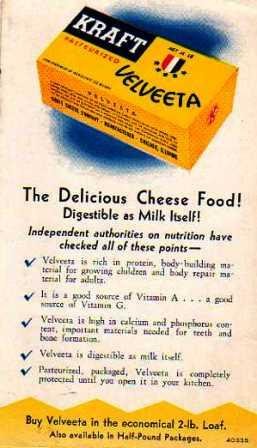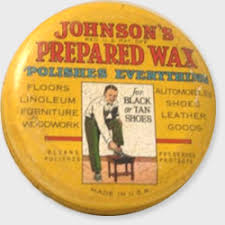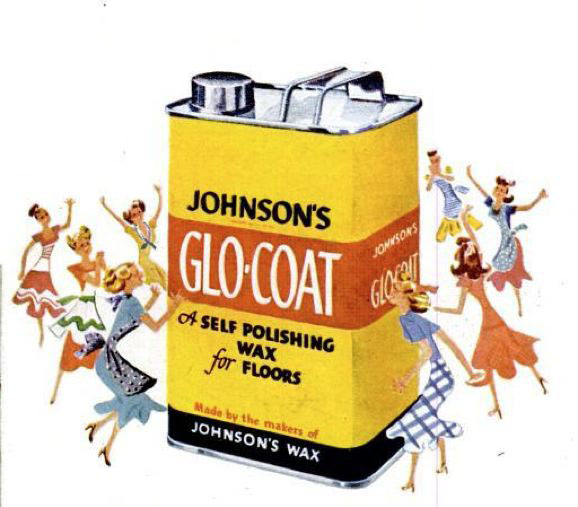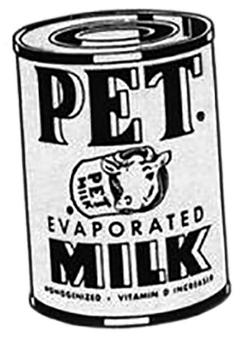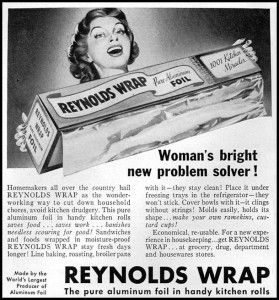Thursday
Do you have music in your own native tongue that you want to share with us?Send an email to
Music, all day, everyday.
Specials
- 2 - 3 AM Sheepslaugh
- 5 - 6 AM Old Time Radio - The Great Gildersleeve
- 7 - 8 AM Theology - Teaching by Dr. J. Rodmann Williams
- 11 - 12 AM Sermonette - Short Message from some of the Greatest Teachers
- 2 - 3 PM Sheepslaugh
- 6 - 7 PM Theology - Teaching by Dr. J. Rodmann Williams
- 7 - 9 PM Parashah Bible Study superseeding Fibber McGee and Molly
- 8 - 9 PM Old Time Radio - Fibber McGee and Molly
- 10 - 12 PM Rock The Clock
Music Styles
| Style | Percentage | Rule |
|---|---|---|
|
Messianic |
13 | M 2 - W 4 |
| Youth | 6.6 | M 1 - W 5 |
| Spanish | 6.6 | M 1 - W 4 |
| Russian | 6.6 | M 1 - W 4 |
| Praise and Worship | 6.6 | M 1 - W 4 |
| Nigerian | 6.6 | M 1 - W 4 |
| Judaic | 6.6 | M 1 - W 4 |
| Italian | 6.6 | M 1 - W 4 |
| Hindi / Tamil | 6.6 | M 1 - W 4 |
| German | 6.6 | M 1 - W 4 |
| French | 6.6 | M 1 - W 4 |
| Dutch | 6.6 | M 1 - W 4 |
| Contemporary Christian Music | 6.6 | M 1 - W 4 |
| Brass | 6.6 | M 1 - W 4 |
Theology Teachings
About Renewal TheologyRenewal Theology deals with all the basic doctrines of the Christian faith. The three volumes were written especially for persons involved in the Pentecostal and charismatic renewal. Now published as three volumes in one, with the subtitle of Systematic Theology from a Charismatic Perspective, the whole of Renewal Theology is readily available. There have been numerous printings of the three volumes as well as foreign translations. Renewal Theology is used as a textbook in several colleges and seminaries. It has also been helpful to many people in study groups and for private reading.From Dr. WilliamsRenewal Theology is in one sense an expression of revitalization. When I came into the renewal in 1965, "God is dead" language was abroad in the land. What happened in my case and that of many others was God's own answer: a powerful self-revelation. John Calvin had long ago declared about God that "the recognition of him consists more in living experience than in vain and high-flown speculation." Now that there was an enhancement of "living experience" in my life, there came about a fresh zeal for teaching theology in its many facets. As I said later in The Era of the Spirit, "A new dynamic has been unleashed that has vitalized various theological categories." Renewal Theology is an expression of theological revitalization.Finally, the concern of Renewal Theology in every area of study is truth. This is not an attempt to advance a particular cause but to understand in totality what the Christian faith proclaims. It is not only a matter of individual doctrines but also of the full round of Christian truth. With this in mind, it has been my prayerful desire that "the Spirit of truth" at every point will lead "into all the truth" (John 16:13). |
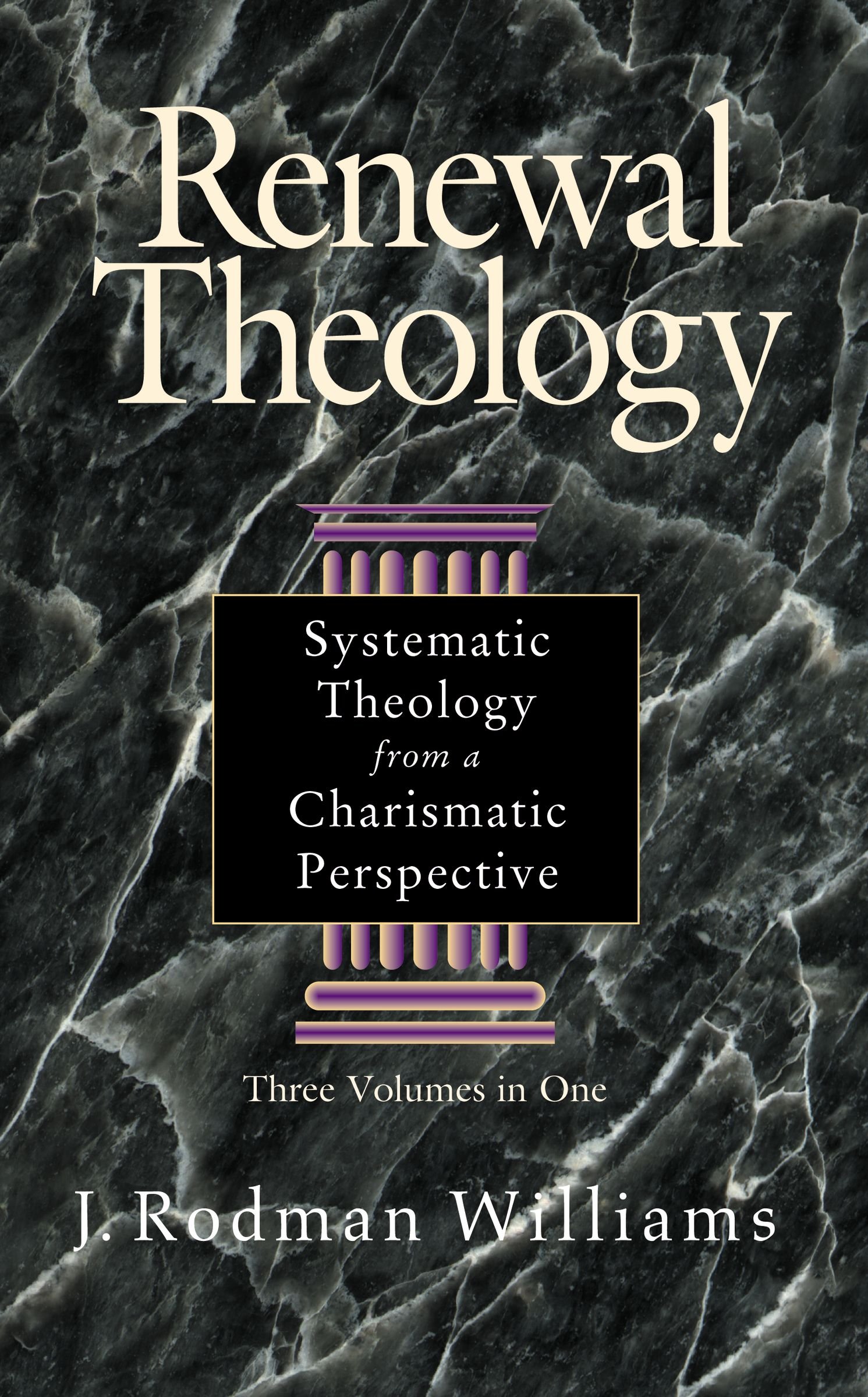 |
|||
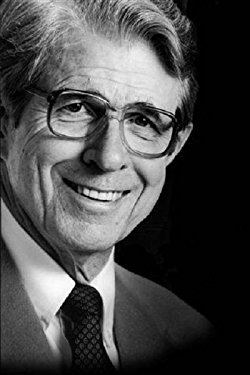 |
About Dr. J. Rodman WilliamsJ. Rodman Williams, born on August 21, 1918, in Clyde, North Carolina, son of John Rodman and Odessa Medford Williams. He was a Phi Beta Kappa graduate of Davidson College in 1939, earned his B.D., and Th.M degrees, 1943-44, from Union Theological Seminary in Virginia, and was ordained in the Presbyterian Church in 1943.He served during World War 2 in the Pacific as chaplain with the First Division of the Marine Corps, 1944-1946. After the war, he earned a Ph.D. in philosophy of Religion and Ethics at Columbia University and Union Seminary. He became chaplain and professor of philosophy at Beloit College in Wisconsin 1949-1952, pastored the First Presbyterian Church of Rockford, Illinois 1952-1959, taught theology and philosophy of religion at Austin Presbyterian Seminary in Texas 1959-1972, and served as president and professor of theology at Melodyland School of Theology in Anaheim, California 1972-1982. Beginning in the fall of 1982, he taught theology at Regent University School of Divinity in Virginia Beach, Virginia, and became Professor of Renewal Theology Emeritus there in 2002. |
|||
SheepLaughs
The Sheep Laughs Comedy Show was a weekly 15 minute professionally-produced and family-friendly variety show, featuring clean comedy by Christian comedians. Standup, skits and songs, all under one hoof! |
||||
 |
Fred PassmoreMy name is Frederick Passmore, and I’m the creator of the Christian Skit Scripts site, among others.I was born at a very early age in Macon, Georgia on October 14, 1958. Since my step-father was in construction and liked to follow the work according to the weather, we moved on the average of every four months. So as I grew up, I attended nearly 20 schools and lived in about 40 different places, mainly over the states of Georgia, Florida, and West Virginia, and Ohio. I accepted Christ, a turning point in my life that changed it forever, as you will see as evidenced in my career choices and creative expressions. I met my wife Patty in West Virginia during a revival in 1979, and we married in 1981. After working at a secular job for a few years, I finally realized that radio and radio production was a major interest, so I began work at a Christian radio station in WV in 1984. At that point I accepted a position with Coral Ridge Ministries in Ft. Lauderdale, FL, and went to work for Dr. James Kennedy, editing and engineering the national radio program “Truths That Transform.” While there long-time friend Jon Lawhon and I formed the Christian Comedy team “Prime Example,” (1993 to 2003). Dr. Guido passed away in 2009, and I no longer work full-time, but maintain the ministry website, social media, program CD duplication and radio program uploads. I also do freelance production at home; the most recent was for Phil Waldrep Ministries new radio program, “Living With Joy!” In 2002 I officially opened this site, Christian Skit Scripts, to supply skits and soundtracks for churches and drama teams. The soundtracks are recorded in my home studio and released on the Sheep Laughs Records independent label. My family moved to a home in Reidsville, GA in 2008 where I have a home office and production studio, and am now self-employed as operator of Sheep Laughs Records. |
|||
Advertisement disclaimer
Old Time Radio Shows contain endorsements and advertisements from yesteryear companies who might still be in business.
EWCMI Online Radio DOES NOT receive Has Not and Will Not receive any financial gain from the Old Time Radio shows.
EWCMI Online Radio DOES NOT necessarily support, underwrite, or agree with the included endorsements and advertisements from the Old Time Radio shows..
The Old Time Radio programs are presented to you for your entertainment only as an alternative to what is broadcasted in our current day, and are available in the public domain.
The Great Gildersleeve
| The Great Gildersleeve was a radio situation comedy broadcast in the USA from August 31, 1941,[1] to 1958.[3] Initially written by Leonard Lewis Levinson,[4] it was one of broadcast history's earliest spin-off programs. The series was built around the character Throckmorton P. Gildersleeve, a regular element of the radio situation comedy Fibber McGee and Molly. The character was introduced in the October 3, 1939 episode (number 216) of that series. Actor Harold Peary had played a similarly named character, Dr. Gildersleeve, on earlier episodes. The Great Gildersleeve enjoyed its greatest popularity in the 1940s. In Fibber McGee and Molly, Peary's Gildersleeve had been a pompous windbag and antagonist of Fibber McGee. "You're a haa-aa-aa-aard man, McGee!" became a Gildersleeve catchphrase. The character went by several aliases on Fibber McGee and Molly; his middle name was revealed to be "Philharmonic" in "Fibber Discovers Gildersleeve's Locked Diary" episode #258 on October 22, 1940. "Gildy" grew so popular that Kraft Foods—promoting its Parkay margarine—sponsored a new series featuring Peary's somewhat mellowed and always The Great Gildersleeve premiered on NBC on August 31, 1941. It moves the title character from the McGees' Wistful Vista to Summerfield, where Gildersleeve oversees his late brother-in-law's estate and rears his orphaned niece and nephew, Marjorie and Leroy Forrester. The household also includes a cook named Birdie. While Gildersleeve had occasionally mentioned his (unseen) wife in some Fibber episodes, in his own series he is a confirmed bachelor. At the outset of the series, Gildersleeve administers a girdle manufacturing company ("If you want a better corset, of course, it's a Gildersleeve"); later and during the remainder of the show he serves as Summerfield's water commissioner. befuddled Gildersleeve as the head of his own family. |
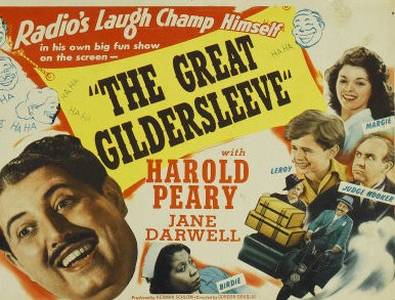 |
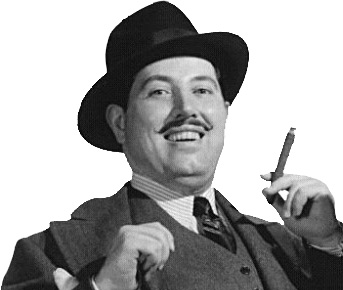 |
Harold (Hal) Peary (July 25, 1908 – March 30, 1985) was an American actor, comedian and singer in radio, films, television, and animation remembered best as Throckmorton P. Gildersleeve, Born as José Pereira de Faria in San Leandro, California, to Portuguese parents,[1] Harold Peary (pronounced "Perry") began working in local radio as early as 1923, according to his own memory, and had his own show as a singer, The Spanish Serenader, in San Francisco, but moved to Chicago, Illinois in 1937. While in San Francisco, he also had "several parts" in Wheatenaville, a program broadcast on NBC's Pacific network beginning September 26, 1932.[2] Peary's Gildersleeve proved popular enough that it was thought to try the character in his own show. Johnson's Wax, which sponsored Fibber McGee & Molly, sponsored an audition recording for The Great Gildersleeve, and the Kraft Cheese Company signed on as the show's regular sponsor. Gildersleeve was transplanted from Wistful Vista to Summerfield with more than just a locale change—now a bachelor (his character had a never-heard wife on Fibber McGee & Molly), and now the water commissioner instead of the owner of the Gildersleeve's Girlish Girdles company. With much of his pomposity and cantankerousness toned down, he was also newly domesticated and appointed guardian of his orphan niece Marjorie and nephew Leroy. Implicitly well-off though by no means wealthy, Gildersleeve was depicted winding up his lingerie-making company and taking up a new life as Summerfield's water commissioner. The Great Gildersleeve premiered August 31, 1941,[3][4] and became a steady hit for the rest of the decade, Peary's sonorous voice and flustered catchphrases ("You're a brii-iii-iight boy, Leroy!" was a modification of his famous McGee catchphrase) among radio's most familiar sounds. Lurene Tuttle played Marjorie; Walter Tetley, a veteran of Fred Allen's Town Hall Tonight cast and other shows, played Leroy; and, Lillian Randolph played Gildersleeve's ego-puncturing maid and housekeeper, Birdie. The show's humor, like that of McGee, was drawn through clever word-play and phrasemaking as well as Gildersleeve's earnest stumbling and basically warmhearted nature. His new nemesis was Judge Horace Hooker (Earle Ross) ("That crook of a Hooker has hooked our cook!"), who oversaw his guardianship of Marjorie and Leroy and became a friend and periodic rival in various schemes. Periodically, storylines were serialized, such as some of Gildersleeve's romantic interests (especially his aborted marriage plans with Leila Ransom) and political aspirations (he once ran for Summerfield mayor); in time, some of the clever word playing was toned down. |
Advertisers
|
||||
Fiber McGee and Molly
| Fibber McGee and Molly was an American radio comedy series. A staple of the NBC Red Network for the show's entire run and one of the most popular and enduring radio series of its time, the prime time situation comedy or it's time. There are people who would argue that Fibber McGee and Molly were the Golden Age of radio. This is partly because of the show's very long (1935-1959) and successful run. But more than just staying power, the show showcased terrific comic and musical talent. Throughout its run, the show was a reflection of its time in the American scene. The stars of the program were real-life husband and wife team James "Jim" Jordan (16 November 1896 – 1 April 1988)[1][2] and Marian Driscoll (15 April 1898 – 7 April 1961),[1][3] who were natives of Peoria, Illinois. Jordan was the seventh of eight children born to James Edward Jordan and Mary (née Tighe) Jordan, while Driscoll was the twelfth out of thirteen children born to Daniel P. and Anna (née Carroll) Driscoll. The son of a farmer, Jim wanted to be a singer; Marian, the daughter of a coal miner, wanted to be a music teacher. Both attended the same Catholic church, where they met at choir practice. Marian's parents had attempted to discourage her professional singing and acting aspirations. When she started seeing young Jim Jordan, the Driscolls were far from approving of Jim and his ideas. Jim's voice teacher gave him a recommendation for work as a professional in Chicago, and he followed it. He was able to have steady work but soon tired of the life on the road. In less than a year, Jim came back to Peoria and went to work for the Post Office. His occupation was now acceptable to Marian's parents, and they stopped objecting to the couple's marriage plans. The pair were married in Peoria on August 31, 1918.[4] The title characters were created and portrayed by Jim and Marian Jordan, a real-life husband and wife team that had been working in radio since the 1920s. Fibber McGee and Molly, which followed up the Jordans' previous radio sitcom Smackout, followed the adventures of a working-class couple, the habitual storyteller Fibber McGee and his sometimes terse but always loving wife Molly, living among their numerous neighbors and acquaintances in the community of Wistful Vista. As with most radio comedies of the era, Fibber McGee and Molly featured an announcer, house band and vocal quartet for interludes. At the peak of the show's success in the 1940s, it was adapted into a string of feature films; a 1959 attempt to adapt the series to television with a different cast and new writers was both a critical and commercial failure, which, coupled with Marian Jordan's death shortly thereafter, brought the series to an end. Living in the fictional Midwestern city of Wistful Vista, Fibber was an American teller of tall tales and a braggart, usually to the exasperation of his long suffering wife Molly. Life in Wistful Vista followed a well developed formula, but was always fresh. Fibber's weekly schemes would be interrupted, inspired by, and often played upon the People of Wistful Vista, a set of regular players and characters that were as beloved as the stars of the program. The program used a series of running gags that would become part of the common language, many treasures can be found in the Closet at 79 Wistful Vista. The show began as a comic reflection of Depression Era America, but as time went on and the shadows of war came over the nation, the show again caught the mood of the country. WWII was fought on the Home front on Wistful Vista as surely as anywhere else in America, but here they had the benefit of Fibber's somewhat addled perspective. |
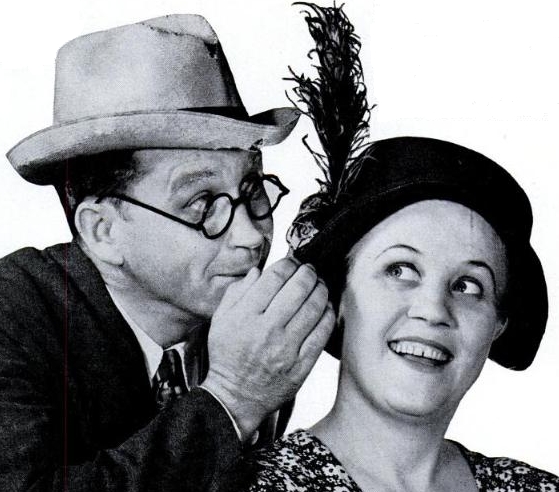 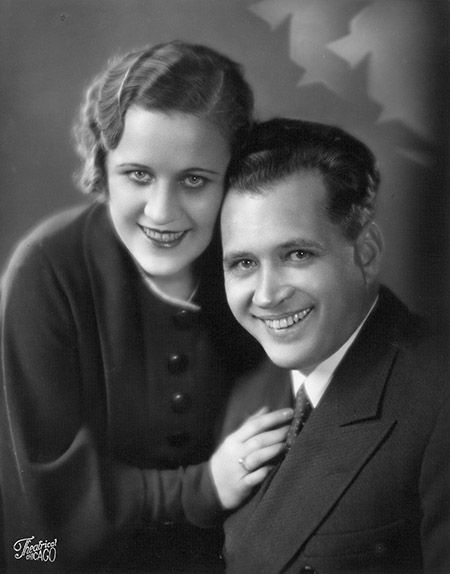 |
|||
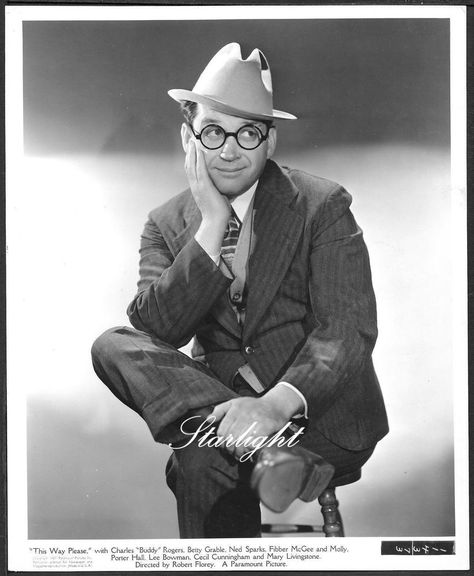 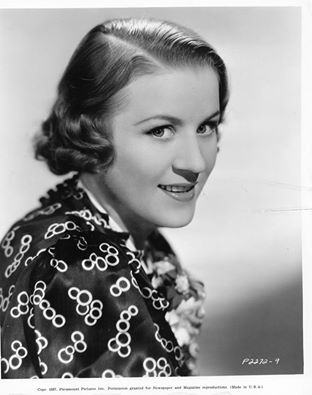 |
James Edward Jordan (November 16, 1896 – April 1, 1988)[1] was the American actor who played Fibber McGee in Fibber McGee and Molly and voiced the albatross Orville in Disney's The Rescuers (1977). Jordan was born in 1896 on a farm near Peoria, Illinois. He attended St. John's Church in Peoria, and his family eventually sold the farm and moved into Peoria. It was at church choir practice that he met Marian Driscoll. Jim Jordan went on the vaudeville circuit, both as a solo act and with his wife, Marian, at various times until 1924. They went entirely broke in 1923, having to be wired money by their parents to get back to Peoria from Lincoln, Illinois.[2]:247 Marian Jordan died in April 1961.[1][2]:252 Jim Jordan married Gretchen Stewart (1909-1998), the widow of radio comic Harry Stewart (Yogi Yorgesson) in 1962; they remained married for the rest of his life,[1] and he remained in semi-retirement.[2]:252 In 1988, he died at the age of 91 in Los Angeles from a blood clot in his brain, caused by a fall at his home.[3] He is buried next to Marian Jordan in the Saint Ann section of Holy Cross Cemetery, Culver City, and is next to the plot of Sharon Tate.[1] Marian Irene Driscoll Jordan (April 15, 1898 – April 7, 1961) was an American actress and radio personality. She was most remembered for portraying the role of Molly McGee, the patient, common sense, honey-natured wife of Fibber McGee. Jordan was born Marian Irene Driscoll on April 15, 1898 in Peoria, Illinois. She was the twelfth of thirteen children born unto parents Daniel P. Driscoll, (January 10, 1858 – March 25, 1916) and Anna Driscoll (née Carroll), (February 28, 1858 – April 28, 1928).[2] Driscoll's paternal great-grandfather, Michael Driscoll, Sr. (1793–1849), immigrated with his wife and children from his hometown of Baltimore, County Cork, Ireland in 1836 to the Boston area and then to Bureau County, Illinois in 1848.[3] As a teenager and young adult, Driscoll gave music lessons and sang in choir at the church which she attended. Jim and Marian, earned very little income. Marian settled on becoming a piano teacher and Jim became a mailman. The two wed on August 31, 1918.[4] They had two children together; a son and a daughter. The two would endure a long career in show business together. The two Jim contracted a case of influenza during the 1918 flu pandemic but survived. After the war ended, Jim stayed in Europe to do Vaudeville performances for wounded soldiers.[5] |
|||
Advertisers
|
||||
Artists
| India; artist to come | Barry & Baya Segal | Devora Clark | Marty Goetz |
| Netherlands; artists to come | Avner & Rachel Boskey | Paul Wilbur | Michae'el Eliyahu Ben David |
| YOUR LANGUAGE | Isreal's Hope | Lamb | Phillip Stanley Klein |
| Ronen Shalom | Sons of Korah | Ted Pearce | Sally Klein O'Connor |
| Helen Shapiro | Jarmula Band | Zemer Levav | Russia;??????_?????????_?_?????_??????? |
| Sharon Wilbur | Lenny and Varda Harris | Inna Pikman | The Hebraism Music Project |








